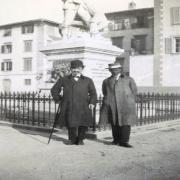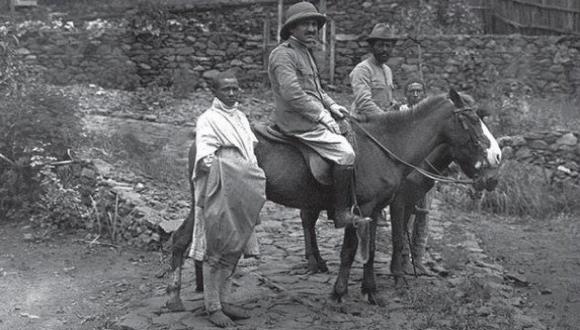Faitlovitch - Ethiopia and Ethiopian Jewry
The collection on the History and Culture of the Horn of Africa and Ethiopia and Ethiopian Jews consists of books in the languages of Ethiopia, rare manuscript, and various archival materials and artefacts from the collection of Dr. Faitlovitch
Sourasky Main Building, 2nd floor, Room 410 | by appointment only | Collection Coordinator: Yael Meiri



 The collection includes amongst other materials
The collection includes amongst other materials
- hundreds of titles discussing the Horn of Africa and Ethiopia in English, French, Italian, German
- some 40 rare manuscripts, in Amharic, Ge'ez, Tigrinya, and Agaw, part of the Faitlovitch Rare Books Collection (part of the Rare Books Collection, Collections Floor, Wiener-Gruss Building)
- historical archival material, such as photographs and special negatives on glass plates
- maps, newspapers, and artefacts from Ethiopia
- The collection also includes the personal archive of Dr. Faitlovitch, including correspondence and diaries, and eulogies, memorials, and commemorations following his death
 From the collection
From the collection
- Chronicles of Ethiopian Kings, Abyssinian Chronicles: The Queen of Sheba
- A Jewish/Ethiopian calendar (1928/9–1933/4)
- The Story of Shlomo Ben-Yitzhak ("The Falasch"), Dr. Faitlovitch's student
- The Bible in the Ge'ez and Amharic languages
- Photographs of the Jewish community in Ethiopia, Ethiopian Royal Family, and the countries of the Horn of Africa
- Photographs donated by Prof. Emeritus Hagai Ehrlich, an expert on Ethiopian history, mostly on Christianity and Islam in Ethiopia
 On Dr. Jacques Faitlovitch
On Dr. Jacques Faitlovitch
Dr. Faitlovitch (1881, Łódź, Poland–1955, Tel Aviv, Israel) studied Oriental Studies and was fluent in Hebrew, several European languages, and some Ethiopian languages, Ge'ez, Amharic, and Tigrinya.
Dr. Faitlovitch first visited Ethiopia in 1904 as part of a research team. Ever since that visit he had dedicated his life to Ethiopian Jews and helped in establishing the personal identities for "Beta Israel" members.
His collection, which had grown and expanded throughout the years, was kept at his house on Vitkin Street. The collection was maintained and organized by Dr. Itzhak Grinfeld, a librarian, who was fluent in several languages, including Ethiopian ones.
Dr. Faitlovitch bequeathed his house and collection to Tel Aviv Municipality after his death; later on, in 1974, his collection was forwarded to the Sourasky Central Library.
 Disclaimer
Disclaimer
Use of materials from Faitlovitch Digital Collection, as well as their duplication and partial or full reproduction in electronic or print format is limited to private, research, or scientific use only in accordance with the rules of fair use specified in the 2007 Copyright Law. The source of the material(s) should be cited in any case of use as: "The Faitlovitch Collection, Sourasky Central Library, Tel Aviv University, Israel." Those wishing to use or obtain copies of the digital material from the site for commercial use, exhibitions, etc., have to obtain written permission from the rights holders
For more information: yaelme@tauex.tau.ac.il | 03-6408747


